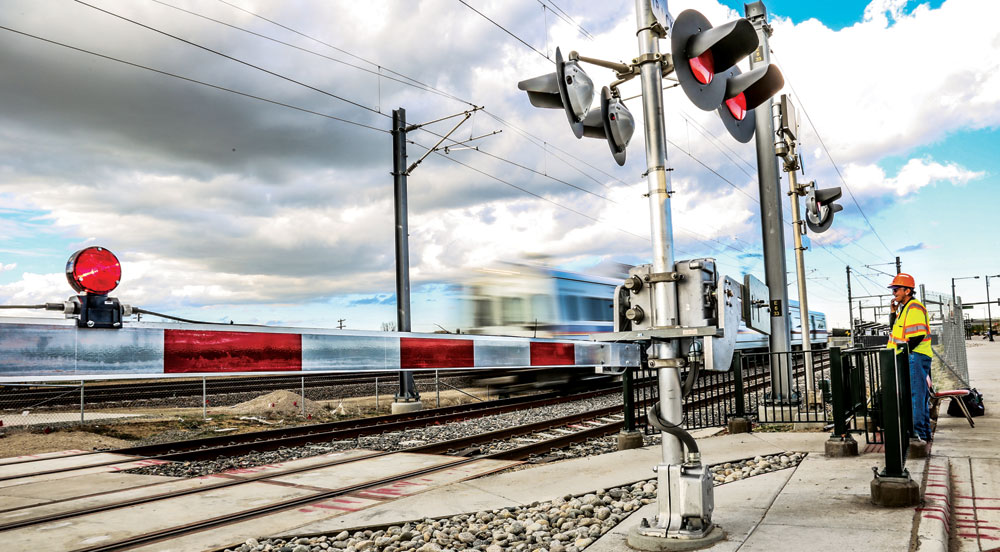
Crossing attendants and A Line horns will continue pending the outcome of a hearing by the Public Utilities Commission
Guidelines have been set for timing at street-level crossings of high-speed commuter trains because the regulators and operators are concerned that “if crossing lights flash for too long, people become distrustful of whether a train is coming at all,” according to a Public Utilities Commission (PUC) decision statement. In such situations, the fear is that frustrated motorists, cyclists or pedestrians might then try to cross the tracks in the face of an oncoming train. Horns and “crossing attendants” (i.e., flagpersons) have remained at street crossings along the A Line because RTD’s positive train control system has not been able to consistently meet the high bar on these timing regulations.
On Sept. 8, RTD applied to the Federal Railroad Administration (FRA) for approval of the Positive Train Control (PTC) system based on the timing level they have achieved. FRA granted that approval on Sept. 28. The Public Utilities Commission (PUC), however, has separate authority to regulate rail crossings in Colorado. On Sept. 27, they denied a request from RTD to change the warning time scheme RTD had proposed before the A Line went into service. The scheme had been approved by the PUC but not achieved by RTD in actual train operations. RTD was requesting permission to change from a constant warning time to one that allows variable warning times. They asked for approval to add up to 15 seconds to the minimum 20-second warning time mandated by the federal government.
The denial from the Sept. 27 PUC meeting was issued in writing on October 25, and less than a week later, on Nov. 2, RTD filed an appeal of the PUC decision and requested to present additional information. On Nov. 9, the PUC Commission agreed to allow a rehearing of RTD’s application. As of this writing, the date for a rehearing has not been set but a PUC spokesman said a December hearing is possible.
Meanwhile, residents along the A Line continue to suffer from the loud horn soundings as the A Line trains pass through each crossing every seven and a half minutes during much of the day and night. Until PUC grants approval of the variable warning times requested by RTD, the applications by Denver and Aurora for a quiet zone will remain on hold.
It is unknown what new evidence RTD and its concessionaire, Denver Transit Partners, can provide the PUC. The commission’s October denial of the first three amended crossing time applications contains strong language. Some examples:
- “The warning times at these crossings are already longer than what we normally see at typical crossings in Colorado because of the large width of the crossings along this alignment.”
- “… the erratic operation of the gates at the crossings.”
- “The request by RTD to now provide up to an additional 15 seconds of warning time means the crossings would no longer provide a constant warning time, but rather an inconsistent warning time of anywhere from the warning time prescribed by the Commission to an additional 15 seconds above that prescribed warning time. This puts establishment of the quiet zones along these commuter rail corridors at jeopardy of not being able to be established because of inconsistent warning times at the crossings.”
- “Perhaps RTD’s Concessionaire has reached the point in time where the path forward to complete this project is a different warning system that will provide the required warning times at the crossing within an electrified power system environment.”
That last comment in the majority decision (Commissioners Jeffrey Ackerman and Wendy Moser) prompted a strong rebuttal by Commissioner Frances Koncilja: “As a result of this decision of the Majority, RTD is left with two unsatisfactory options: keep the flaggers in place—a solution that RTD has told this Commission is unsustainable … or scrap the system (which will likely cost millions of dollars—we do not know how much) and ‘try something different.’”
At its Nov. 16 meeting, the commissioners expressed a desire to see the matter resolved in an expedited fashion.




0 Comments